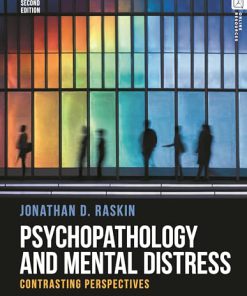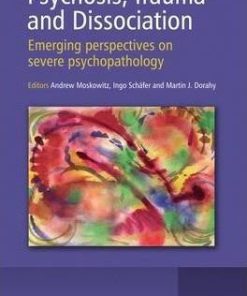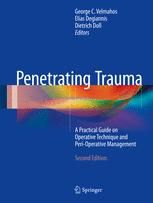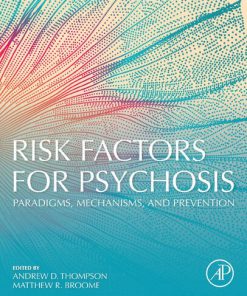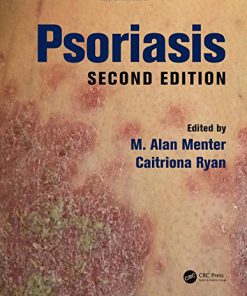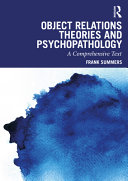Psychosis dissociation and trauma evolving perspectives on severe psychopathology 2nd Edition by Andrew Moskowitz 1118586020 9781118586020
$50.00 Original price was: $50.00.$25.00Current price is: $25.00.
Psychosis, dissociation, and trauma: evolving perspectives on severe psychopathology 2nd Edition by Andrew Moskowitz – Ebook PDF Instant Download/DeliveryISBN: 1118586020, 9781118586020
Full download Psychosis, dissociation, and trauma: evolving perspectives on severe psychopathology 2nd Edition after payment.
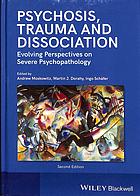
Product details:
ISBN-10 : 1118586020
ISBN-13 : 9781118586020
Author: Andrew Moskowitz
An invaluable sourcebook on the complex relationship between psychosis, trauma, and dissociation, thoroughly revised and updated This revised and updated second edition of Psychosis, Trauma and Dissociation offers an important resource that takes a wide-ranging and in-depth look at the multifaceted relationship between trauma, dissociation and psychosis. The editors – leaders in their field – have drawn together more than fifty noted experts from around the world, to canvas the relevant literature from historical, conceptual, empirical and clinical perspectives. The result documents the impressive gains made over the past ten years in understanding multiple aspects of the interface between trauma, dissociation and psychosis.
Psychosis, dissociation, and trauma: evolving perspectives on severe psychopathology 2nd Table of contents:
Part I: Historical and Conceptual Perspectives
1 Defining Psychosis, Trauma, and Dissociation
Psychosis
Trauma
Dissociation
Schneiderian Symptoms as Dissociation or Psychosis?
Conclusion
References
2 Historical Conceptions of Dissociative and Psychotic Disorders
Dissociation: Mesmerism, Multiple Personalities, and Hysteria
Psychosis: Insanity, Dementia Praecox, and Schizophrenia
Dissociation, Psychosis, and Schizophrenia: The Merging of Constructs
Conclusion
References
3 Hysterical Psychosis
Early Literature on Hysterical Psychosis
Hysterical Psychosis in Pierre Janet’s Dissociation Theory
The Decline of Hysteria
The Return of the Diagnosis of Hysterical Psychosis
Systematic and Empirical Studies
HP and Reactive Psychosis
Integration and Concluding Remarks
References
4 The Role of Dissociation in the Historical Concept of Schizophrenia
Eugen Bleuler and the Creation of Schizophrenia
Kurt Schneider and the ‘First‐rank’ Symptoms of Schizophrenia
References
5 Ego‐Fragmentation in Schizophrenia
Schizophrenic Syndromes as Self‐disorders
The Construct of Ego‐pathology
Clinical Elaboration of Ego‐pathology
Ego‐Fragmentation, Association and the Dissociation Model
Dissociative Mechanisms: What and Where?
The Continuum of Dissociative Mechanisms: The Spectrum of Dissociation
References
6 From Hysteria to Chronic Relational Trauma Disorder
Historical Overview
Theoretical Analysis
Summary
References
7 An Attachment Perspective on Schizophrenia
Caregiver Disorganization, Attachment Disorganization, and Dissociation
Patterns of Early Interpersonal Interaction
Trauma and Loss in the Lives of Primary Caregivers of Psychiatric Patients
Disorganization, Dissociation, and Psychotic Experiences
Attachment and Affect Regulation in Psychosis
Metacognition, Mentalization, and Affect Regulation
Summary and Theoretical Integration
Concluding Remarks
References
8 Childhood Experiences and Delusions
Delusions
Memory
Disorganized Attachment and Disrupted Parent–Child Communication
The Retrieval of Early Life Memories
The Schreber Case: Delusions and Early Childhood Experiences
Parent–Infant Communication and the Double Bind Theory of Schizophrenia
Discussion and Integration
References
Part II: Research Perspectives
9 Childhood Trauma in Psychotic and Dissociative Disorders
Childhood Trauma in Patients with Psychotic Disorders
Childhood Trauma in Patients with Dissociative Disorders
The Continuum of Dissociative and Psychotic Disorders
References
10 Structural Brain Changes in Psychotic Disorders, Dissociative Disorders, and After Childhood Adversity
Introduction
Methods
Hippocampus
Amygdala
Frontal Lobes
Insula
Functional Relationships between Brain Regions
Discussion
Conclusion
References
11 Dissociative Symptoms in Schizophrenia Spectrum Disorders
Introduction
Empirical Studies on Dissociation in Patients Diagnosed with Schizophrenia
Dissociation in Schizophrenia Spectrum Disorders – What Could It Mean?
Conclusion
References
12 Psychotic Symptoms in Dissociative Disorders
Hallucinations
Grossly Disorganized Behaviour
Formal Thought Disorder
Impairment in Reality Testing: Trance‐Logic or Genuine Delusions?
Schneiderian Symptoms: Are they Non‐specific?
Acute Dissociative Disorder with Psychotic Features
Comorbidity between Psychotic and Dissociative Disorders
An Interaction (Duality) Model
Conclusion
References
13 Auditory Verbal Hallucinations
Prevalence of Voice Hearing in Non‐clinical Groups
Voice Phenomenology
Auditory Hallucinations in Clinical and Non‐clinical Groups: Similarities and Differences
Trauma and Dissociation
Empirical Evidence for the Role of Dissociation in Auditory Hallucinations
Voice Hearing as a Dialogical Experience
Discussion and Conclusion
References
14 The Value of Hypnotizability in Differentiating Dissociative from Psychotic Disorders
Hypnosis as an Outcome
The Neurophenomenology of the Hypnotic State
Hypnotizability Assessment
Hypnotizability and Differential Diagnoses in Psychiatry
Concluding Remarks
References
15 Depersonalization/Derealization Disorder and Schizotypal Personality Disorder
Symptoms and Clinical Presentations of Depersonalization/Derealization Disorder and Schizotypal Personality Disorder
Cognitive Profiles of Depersonalization/Derealization and Schizotypy
Neurobiological Functioning in Depersonalization/Derealization and Schizotypy
Clinical Vignettes
Conclusion
References
16 Post‐traumatic Stress Disorder with Psychotic Features
Post‐psychotic PTSD: The Trauma of Psychotic Symptomatology and Hospitalization
Co‐occurring PTSD Symptoms and Psychotic Experiences
The Potential Role of Dissociation in the Development of a Psychotic PTSD Subtype
Conclusion and Future Directions
References
17 Memory Disturbances in Schizophrenia and Post‐traumatic Stress Disorder
Cognitive Factors Associated With Vulnerability to Schizophrenia and PTSD
Memory Disturbances in Schizophrenia and PTSD
Conclusion
References
18 Cognitive Perspectives on Dissociation and Psychosis
Trauma and Threat in Dissociative and Psychotic Individuals
Attention and Working Memory
Conclusion
References
Part III: Clinical Perspectives
19 Dissociative Psychosis
Dissociative Psychosis and Pierre Janet’s Dissociation Theory
Dissociative Psychosis and the Theory of Structural Dissociation of Personality
Discussion and Conclusion
References
20 Dissociative Schizophrenia
A Broader Conception of Structural Dissociation and Dissociative Disorders
The Dissociative Subtype of Schizophrenia
A Clinical Case Example of Dissociative Schizophrenia
Research Data Supporting the Existence of Dissociative Schizophrenia
Research and Clinical Implications of Dissociative Schizophrenia
References
21 Advances in Clinical Assessment
DID and Schizophrenia: Overlapping/Non‐specific Symptoms
Assessment of Dissociation in DID and Schizophrenia
Distinguishing DID from Schizophrenia: Identifying Diagnostically Distinct Features Based on the SCID‐D Interview
Summary and Clinical Implications
References
22 A Psychological Assessment Perspective on Clinical and Conceptual Distinctions Between Dissociative Disorders and Psychotic Disorders
Cognitive Assessment
Structured Personality Tests and Broad Symptom Measures
Trauma‐focused Symptom Measures
Summary
Projective Testing with the Rorschach
Assessment Recommendations for Distinguishing Dissociative Patients and Psychotic Patients
References
23 The Role of Double Binds, Reality Testing, and Chronic Relational Trauma in the Genesis and Treatment of Borderline Personality Disorder
The Effects of Relational Trauma on Reality Testing
Caregiver Pathology, Double Binds, Disorganized Attachment, and Dissociated Self‐states
Treating the Effects of Dissociative, Psychotic, or Sociopathic Caregivers on Reality Testing
Conclusion: Borderline Psychotic Traits Stemming from Relational Trauma Require Relational Treatment
References
24 Accepting and Working with Voices
The History of the Maastricht Approach and the Hearing Voices Movement
Recovery
Talking with Voices
Future Directions for the Maastricht Approach
Summary
References
25 Trauma Therapy for Psychosis?
Basic Notions about EMDR Therapy
The Evidence for EMDR Therapy’s Effectiveness in Psychosis
Clinical Cases
Conclusions
References
26 Treating Dissociative and Psychotic Disorders Psychodynamically
Historical Background
Clinical Vignettes
Treating Dissociative States
The Role of Trauma in Creating Psychopathology
Conclusion
References
27 Dissociation, Psychosis and Spirituality
A Cosmic Battle: Patte’s Story – Part 1
Māori Perspectives
Shamanic Crisis
A Cosmic Battle – Part 2
The Subjugation of Other Cultural Perspectives
Dissociation and Psychosis as States of Consciousness
A Cosmic Battle – Part 3
From Victim to Victor – A New Model
People also search for Psychosis, dissociation, and trauma: evolving perspectives on severe psychopathology 2nd:
psychosis dissociation and trauma
psychosis trauma and dissociation pdf
psychosis trauma and dissociation book
can trauma cause psychosis
can emotional trauma cause psychosis
Tags: Psychosis, dissociation, trauma, evolving perspectives, psychopathology, Andrew Moskowitz
You may also like…
Psychology - Psychopathy
Psychopathology and Mental Distress Contrasting Perspectives 2nd Edition Jonathon D. Raskin
Psychology - Psychopathy
Psychology - Psychological Disorders
Technique - Food Manufacturing
Chocolate science and technology, 2nd ed 2nd Edition Emmanuel Ohene Afoakwa
Cookbooks
Medicine - Internal Medicine
Psychology - Psychopathy




